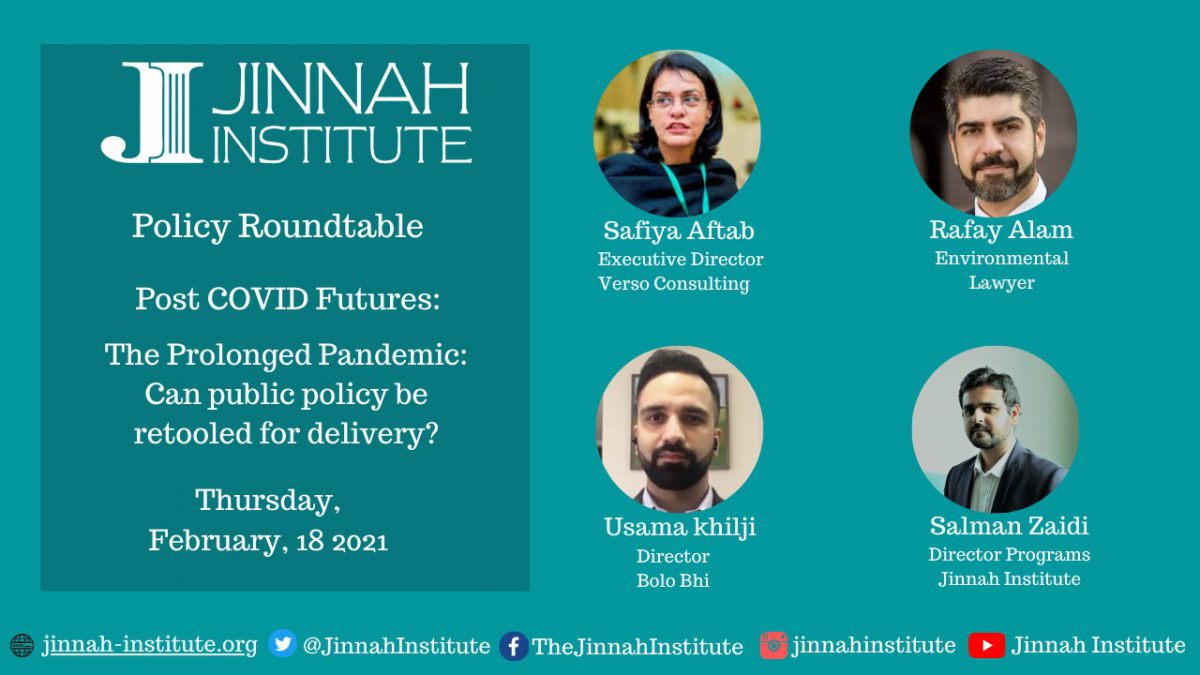Post COVID Futures Round Table
Post-COVID Futures: The Prolonged Pandemic: Can public policy be retooled for delivery?
Date: February 19, 2021
Moderator:
–Salman Zaidi, Director Programs, Jinnah Institute
Panelists:
-Safiya Aftab, Executive Director, Verso Consulting
-Rafay Alam, Environmental Lawyer
-Usama Khilji, Director, Bolo Bhi
The Jinnah Institute is compiling a research report on Post-COVID futures which evaluates the response to the pandemic in reference to key policy sectors, and attempts to piece together a picture of what a post-pandemic world may look like. In anticipation of the launch of this report, JI brought together the authors of the report to discuss their findings and recommendations.
Focusing on how the social sectors have fared during the pandemic, Safiya Aftab’s assessment was that the report card has been mixed. The response of the government during the initial stages of the pandemic was a positive one, despite there being a delay on their part in acknowledging the magnitude of the problem. However, with the NCOC being formed by March, we witnessed an effort on the government’s part to bring the federal and provincial coordination on the same page. The unfortunate aspect was that this government response petered out over time, especially once the peak of the first wave passed. This attitude was reflected in the vaccine procurement process as well considering the amount of confusion and misinformation that was generated. She added that COVID has exposed faultiness in the economy and social service sectors such as education. Particularly in the case of the health sector, Pakistan has fortunately gotten away without incurring major damage, but it remains to be seen what the long-term effects are. Ms. Aftab further lamented the government’s approach of instituting stop-gap measures rather than seeking out long-term solutions to structural ailments. COVID has highlighted several opportunities as well. Telehealth services need to be further looked into, as services such as remote medical consultations have caught on even in smaller cities. Additionally, the pandemic has illustrated the benefits of updating and disseminating data, and has aided policy makers as well. Ms. Aftab recommended that this should be done on a routine basis and not just during a crisis.
On the topic of what lessons can be drawn from COVID when it comes to tackling the climate crisis, Rafay Alam put forth a bleak assessment of the government’s efforts regarding both the crises. He pointed out that health was and should be a provincial matter. According to him, the friction witnessed between the federal and provincial governments at the onset of the pandemic was unfortunate, and so was the Supreme Court’s role in taking suo moto action to get the center and the provinces on the same page. Mr. Alam highlighted that it makes sense for climate change to be a provincial subject because of how the impact is localised. Pakistan’s climate change policy is outdated and that the science of climate crisis has moved on. He argued that the response to COVID mirrors the centralization of response to the climate crisis. In his recommendations, he stressed that federal policy making should involve more coordination and communication with provinces and political opponents.
Looking at the post-COVID future from the lens of technology, Usama Khilji examined whether tech has been able to assist young people vis-à-vis their livelihood and education. Mr. Khilji pointed out that while the penetration rate of technology among the youth continues to increase, the pandemic once again highlighted the digital divide that exists. He explained that this divide is determined by geography in some cases, as areas in Balochistan, former FATA, and Azad Kashmir remain offline. There is also a gendered aspect to this divide, as the percentage of women with access to internet is significantly lower than that of men. When it comes to evaluating the role that technology has played in delivering essential information regarding COVID, we have witnessed a lot of misinformation surrounding the vaccine, which allows us to draw parallels to the Polio vaccination drive. On the question of whether technology has enabled positive engagement with the government and politics, Mr. Khilji noted that while there have been some positive attempts on part of the government, concerns remain surrounding transparency and the privacy of data. Technology is also being used as a tool for misinformation and smear campaigns against those critical of the government. Unfortunately, the government has been a bystander and even an instigator on some occasions, added Mr. Khilji. Moreover, legislation regarding online content regulation leaves a lot to be desired. What is lacking is a multi-stakeholder collaborative process of devising policy. He recommended that the decision-making process must be transparent, consultative, and democratic rather than ad-hoc and short-term. The process should factor in the diversity that characterises Pakistan.
Follow the link to watch full video:

